#Kozmic Blues Band
Text
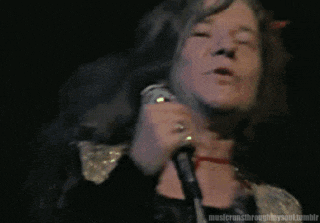

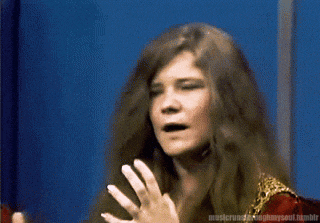



Happy birthday, Janis Joplin! 💙 (January 19, 1943 – October 4, 1970)
Quotes by artists influenced by Janis' legacy below:
"Janis put herself out there completely, and her voice was not only strong and soulful, it was painfully and beautifully real. She sang in the great tradition of the rhythm & blues singers that were her heroes, but she brought her own dangerous, sexy rock & roll edge to every single song. She really gave you a piece of her heart. And that inspired me to find my own voice and my own style." - Stevie Nicks
"I think she allowed women to have their pain. Her thing was so borne from her pain. Her amazing talent was because of the pain she had...I think she was so misunderstood, and she was so intelligent, emotionally intelligent, and what came out of her was almost beyond what her physical body could even do as a singer, and what she was putting across." - Nancy Wilson (of Heart) on Janis
"That’s really how I learned [to sing], and I was already listening to the greats like Janis Joplin, who I loved to death, and who was one of the greatest rock singers ever..." - Rob Halford (of Judas Priest)
"I never knew Janis, I never saw her or heard her voice live, I never witnessed the fireball of fury that she unleashed onstage, but I think I understand. When a soul can look on the world, and see and feel the pain and loneliness, and can reach deep down inside, and find a voice to sing of it, a soul can heal. And hers did." - Melissa Etheridge
"I saw Janis Joplin when I was 15. I heard her sing, and I couldn’t believe she was smoking on stage, she was drinking Southern Comfort, and she sang like no other. She could sing a song entitled, 'Take A Little Piece of My Heart' and deliver it so beautifully, amazingly." - Steven Tyler (of Aerosmith)
"She was such a huge influence on me. Because she was so different to any other female vocalist of the time. I was used to Cilla Black, Dusty Springfield and those sort of singers, who were great, but Joplin was unique. She was not a pop star, but really belted out those songs. There was so much emotion in something like 'Move Over.'" - Enid Williams (of Girlschool)
"You listen to a Janis Joplin record and she just puts — she wears everything on her sleeve, whether she's completely drugged up, it's on her sleeve. If she's totally just passionately screaming at the top of her lungs, it's on her sleeve. You feel like whatever she's talking about and whatever she's singing about, she sang it with no cares, no second thoughts, no looking back. She didn't say, 'You know what, let's take that take again.' She sang it and she sang it with every bone in her body, and that was that." - Alicia Keys
#HAPPY BIRTHDAY QUEEN#Janis Joplin#gifs#my gifs#classic rock#blues rock#psychedelic rock#1960s#1970s#Big Brother and the Holding Company#Kozmic Blues Band#Full-Tilt Boogie Band#Stevie Nicks#Nancy Wilson#Rob Halford#Melissa Etheridge#Steven Tyler#Enid Williams#Alicia Keys#quotes#I love you so much Janis. I am grateful for & inspired by your legacy - your talent; skill; PASSION; consideration; & sincerity - every day
89 notes
·
View notes
Video
youtube
Lecture 12: Janis Joplin left Big Brother and the Holding Company in 1968 and organized another group, the Kozmic Blues Band. In the last year of her life, her music evolved into a more soulful and bluesy style that emphasized her voice even more than her music with Big Brother. In this video, Janis performs a song titled “Kozmic Blues” at a 1970 concert in Frankfurt. They perform such songs as “Try (Just a Little Bit Harder),” “Me,” “Maybe,” “Summertime” and “Ball and Chain.” The Kozmic Blues band consisted of a variety of different musicians, including Joplin’s former Big Brother band mate Sam Andrew and legendary Blues guitarist Mike Bloomfield. I Got Dem Ol’ Kozmic Blues Again Mama! was Joplin’s only solo album released during her lifetime. Her next album, Pearl, came out posthumously. (Incidentally, this concert footage also includes brief interview segments -- check it out!)
#Janis Joplin#The Kozmic Blues Band#Sam Andrew#Mike Bloomfield#Pearl (1971 album)#concert footage#interviews
1 note
·
View note
Text
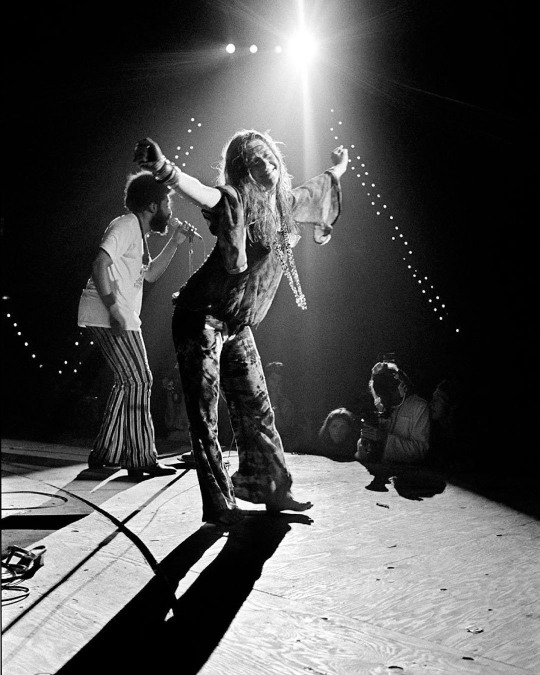

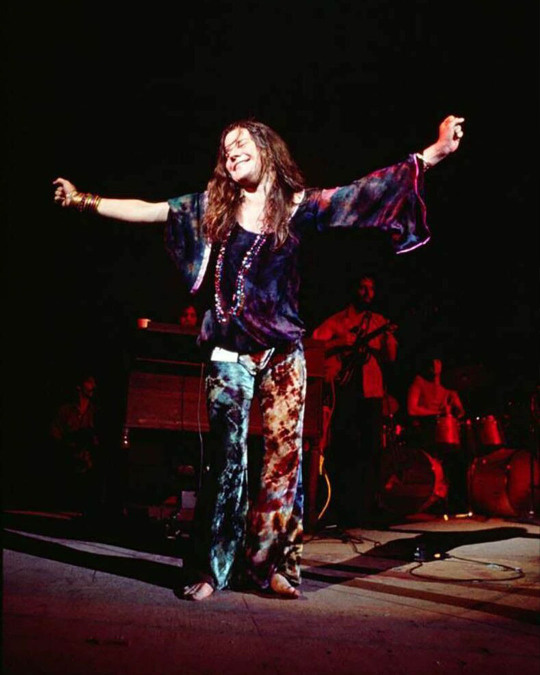
Born on this Day: The iconic Janis Joplin (#Bi2).
In the early hours, between midnight and dawn, on Sunday, August 17, 1969, Janis Joplin took to the stage, marking a historic moment during the three-day Woodstock Music and Art Fair in Bethel, New York. Draped in her signature long-sleeved tie-dyed outfit, this performance held special significance as it was Joplin's first major solo act after parting ways with her band, Big Brother & The Holding Company, a year earlier following the release of their album "Cheap Thrills".
Facing an unexpectedly massive crowd, Joplin fearlessly entertained with a mix of new songs, covers, and beloved Big Brother favorites. While initially criticized for departing from her iconic performances with Big Brother (notably at the 1967 Monterey Pop Festival), Joplin's Woodstock show secured her place in rock history.
Joplin asked the audience in the dark, "How are you guys out there? You're staying stoned and you got enough water and you got a place to sleep and everything? Because all of us — and I don't mean to be preachy — but we oughta remember, and that means promoters too, that music's for grooving, man, and music's not for putting yourself through bad changes. You don't have to take anybody's shit, man, just to enjoy music."
Joplin kicked off her performance with a spirited rendition of Eddie Floyd's "Raise Your Hand," backed by the Kozmic Blues Band. This lineup included guitarist John Till, keyboardist Richard Kermode, bassist Brad Campbell, drummer Maury Baker, along with Terry Clements on tenor saxophone, Luis Gasca on trumpet, and Cornelius "Snooky" Flowers on baritone saxophone.
The band introduced their first new track, "As Good As You've Been To This World", from Joplin's upcoming 1969 debut album "I Got Dem Ol' Kozmic Blues Again Mama!" Transitioning to a mellower groove, Joplin delivered a soulful rendition of the Bee Gees' hit "To Love Somebody", also featured on her "new" album, followed by a sultry interpretation of George and Ira Gershwin's classic standard "Summertime", previously covered on "Cheap Thrills".
Joplin poured her heart into the 11-song set, pushing her vocal limits. She regained the energy with two more new songs, "Try (Just A Little Bit Harder)" and the heartfelt ballad "Kozmic Blues".
Tenor saxophonist Snooky Flowers joined in for a spirited rendition of Otis Redding's 1965 hit "Can't Turn You Loose" before the set's grand finale, "Work Me, Lord", a Nick Gravenites composition that Joplin belted out until her voice could carry no more.
Encouraged by the roaring audience, Joplin returned to the stage, concluding her Woodstock performance with two tracks from "Cheap Thrills." These songs were her iconic hit "Piece Of My Heart" and a fervent cover of Big Mama Thornton's "Ball And Chain", delivering every ounce of herself to the enthralled crowd.
☮️: https://bi.org/en/famous/janis-joplin
#janis joplin#woodstock#woodstock 1969#woodstock festival#60s rock#bisexuality#bi#queer#lgbtq#lgbtqia#bi pride#bi visibility#lgbt#bivisibility#classic rock#hippie#free love#peace#flower child#bisexual women#bi women#bisexual woman#bi woman#bisexual#representationmatters#music history#historic moment#lgbt history#queer history
17 notes
·
View notes
Video
youtube
Janis Joplin and Mike Bloomfield with the Kozmic Blues Band One Good Man 1969
Janis always rips my heart out and does so again here. Mike’s blues playing is even more sharp and smoldering than it usually was. A great cut.
47 notes
·
View notes
Photo

▶Track-List: For All 38 Disc of Music - Play Below. Woodstock-Back To The Garden - The-Definitive-50th-Anniversary-Archive
Play ▶ Disc 1 Richie Havens - August 15,1969
Play ▶ Disc 2 Sweetwater - August 15,1969
Play ▶ Disc 3 Bert Sommer - August 15,1969
Play ▶ Disc 4 Tim Hardin - August 15,1969
Play ▶ Disc 5 Ravi Shankar - August 16,1969
Play ▶ Disc 6 Melanie - August 16,1969
Play ▶ Disc 7 Arlo Guthrie - August 16,1969
Play ▶ Disc 8 Joan Baez - August 161969
Play ▶ Disc 9 Quill - August 16,1969
Play ▶ Disc 10 Country Joe McDonald - August 16,1969
Play ▶ Disc 11 Santana - August 16,1969
Play ▶ Disc 12 John Sebastian - August 16,1969
Play ▶ Disc 13 The Keef Hartley Band - August 16,1969
Play ▶ Disc 14 The Incredible String Band - August 16,1969
Play ▶ Disc 15 Canned Heat (Part 1) - August 16,1969
Play ▶ Disc 16 Canned Heat (Part 2) - August 16,1969
Play ▶ Disc 17 Mountain - August 16,1969
Play ▶ Disc 18 The Grateful Dead (Part 1) - August 16,1969
Play ▶ Disc 19 The Grateful Dead (Part 2) - August 16,1969
Play ▶ Disc 20 Creedence Clearwater Revival - August 17,1969
Play ▶ Disc 21 Janis Joplin & The Kozmic Blues Band - August 17,1969
Play ▶ Disc 22 Sly & The Family Stone - August 17,1969
Play ▶ Disc 23 The Who - August 17,1969
Play ▶ Disc 24 Jefferson Airplane (Part 1) - August 17,1969
Play ▶ Disc 25 Jefferson Airplane (Part 2) - August 17,1969
Play ▶ Disc 26 Joe Cocker & The Grease Band (Part 1) - August 17,1969
Play ▶ Disc 27 Joe Cocker & The Grease Band (Part 2) - August 17,1969
Play ▶ Disc 28 Country Joe And The Fish - August 17,1969
Play ▶ Disc 29 Ten Years After - August 17,1969
Play ▶ Disc 30 The Band - August 17,1969
Play ▶ Disc 31 Johnny Winter & Edgar Winter - August 18,1969
Play ▶ Disc 32 Blood, Sweat And Tears - August 18,1969
Play ▶ Disc 33 Crosby, Stills, Nash & Young - August 18,1969
Play ▶ Disc 34 The Paul Butterfield Blues Band - August 18,1969
Play ▶ Disc 35 Sha Na Na - August 18,1969
Play ▶ Disc 36 Jimi Hendrix / Gypsy Sun & Rainbows (Pt.1) - August 18,1969
Play ▶ Disc 37 Jimi Hendrix / Gypsy Sun & Rainbows (Pt.2) - August 18,1969
Play ▶ Disc 38 Appendix (Stage Announcements & Audience Sounds)
#Woodstock 1969#Complete Festival#Richie Havens#Sweetwater#Bert Sommer#Tim Hardin#Ravi Shankar#Melanie#Arlo Guthrie#Joan Baez#Quill#Country Joe McDonald#Santana#John Sebastian#The Keef Hartley Band#The Incredible String Band#Canned Heat#Mountain#The Grateful Dead#Creedence Clearwater Revival#Janis Joplin#The Kozmic Blues Band#Sly & The Family Stone#The Who#Jefferson Airplane#Joe Cocker#The Grease Band#Country Joe And The Fish#Ten Years After#The Band
4 notes
·
View notes
Note
2, 14 and 18 for the music questions please!
2. an album you wish you could hear again for the first time
Hm. I think Arlo Guthrie's Alice's Restaurant would be fun just because you wouldn't know what to expect from it, and it's probably as funny to an adult stoner as it is to kids.
14. is there any band/musician who you really strongly dislike? if so, why?
Can't do Phish, can't do Steely Dan, and I know this is blasphemy here but Kate Bush bugs me. She's an acquired taste and I've got the soapy cilantro gene about her.
18. what decade do you think had the best music? is there any particular year that you think was the best?
You decade-limit Miette? You decade-limit Miette like someone who isn't 24/7 time traveling in spirit?

I kid. Close call, but 60s. With the totally unoriginal opinion of '69 as a frontrunner. But that's because you've got the first (and only tolerable, if you dislike long guitar solos) Zeppelin album, you've got TOMMY, you've got Janis' Kozmic Blues, Doors' Soft Parade, Woodstock... lots going on there and all of it very fucking groovy.
2 notes
·
View notes
Text

"Mo Soul" Player Playlist 27 April
Mark Farina - Cali Spacess (Julius Papp Mix)
The Brand New Heavies - Ride In The Sky
Incognito - Mindin' My Business
Hiroshi Fukumura & Sadao Watanabe - Hunt Up Wind
Kozmic Trooths - Dave Allen At Large (Blarney's Stoned)
Tim Wood - A Taste Of Honey
Space Invadas - Way We Feel
Da Lata - Changes
Jean-Claude Pelletier - Streaking Land
S-Tone Inc - Take 4
Reuben Bell - Superjock
Urban Species - Spiritual Love
Milcho Leviev - Blue Levis
Toshiyuki Honda - Thunderkiss
Patricia Marx - Burning Luv
If you really want to enjoy music and help musicians and bands, buy their lp’s or cd’s and don’t download mp3 formats. There is nothing like good quality sound!!!
(Angel Lo Verde / Mo Soul)
#mo soul#playlist#music#soul#blues#funk#jazz#lounge#reggae#rock#fusion#house#r&b#afro funk#disco funk#acid jazz#nu jazz
1 note
·
View note
Text
Janis Joplin "
I. Introduction
A. Brief overview of Janis Joplin's life and career
B. Importance of Janis Joplin in music history
II. Early Life
A. Childhood and family background
B. Early musical influences
C. Move to San Francisco and introduction to the music scene
III. Career Highlights
A. Joining Big Brother and the Holding Company
B. Woodstock and Monterey Pop Festival performances
C. Solo career and the Kozmic Blues Band
D. Posthumous releases and legacy
IV. Personal Life
A. Struggles with drug and alcohol addiction
B. Relationships and romantic life
C. Feminism and Janis Joplin's impact on women in music
V. Musical Style
A. Influences and musical inspirations
B. Vocal style and stage presence
C. Evolution of Janis Joplin's musical style
VI. Impact on Music
A. Influence on other musicians and artists
B. Janis Joplin's role in the counterculture movement
C. Legacy and continued relevance in music today
VII. Conclusion
A. Summary of Janis Joplin's life and career
B. Importance of Janis Joplin's music and legacy
I. Introduction
Janis Joplin was a unique and influential figure in the music industry. Born in 1943 in Port Arthur, Texas, Joplin's short but powerful career left an indelible mark on the rock and roll genre. Known for her soulful and bluesy voice, wild stage presence, and fearless attitude, Joplin's music continues to inspire and resonate with fans today.
In this blog, we will delve into the life, career, and impact of Janis Joplin. We will explore her early years, career highlights, personal life, musical style, and legacy. We will also examine Joplin's role in the counterculture movement and her influence on other musicians and artists. By the end of this blog, you will have a deeper understanding of Janis Joplin's importance in music history and her lasting impact on the industry.
A. Brief Overview of Janis Joplin's Life and Career
Janis Joplin was born on January 19, 1943, in Port Arthur, Texas. She grew up in a conservative and religious household but rebelled against societal norms from a young age. Joplin was a talented artist and musician, and she pursued her passion for music in her late teens.
In 1966, Joplin moved to San Francisco and joined the psychedelic rock band Big Brother and the Holding Company. The band gained popularity for their electrifying live performances, and Joplin quickly became the face of the group. In 1967, they released their debut album, "Big Brother & the Holding Company," which included the hit single "Piece of My Heart."
Joplin's incredible voice and wild stage presence caught the attention of music industry executives, and she soon went solo. She formed the Kozmic Blues Band and released her first solo album, "I Got Dem Ol' Kozmic Blues Again Mama!" in 1969. The album was a commercial success, but Joplin's struggles with addiction and personal demons were taking a toll on her health.
On October 4, 1970, Janis Joplin was found dead in her hotel room in Los Angeles, California. She was only 27 years old. Joplin's death was a shock to the music world, and her legacy continues to inspire generations of musicians and fans alike.
B. Importance of Janis Joplin in Music History
Janis Joplin's impact on music history is significant and enduring. She was a trailblazer in the male-dominated rock and roll industry, breaking down barriers and paving the way for future generations of female artists. Joplin's unique style, powerful voice, and raw energy revolutionized the rock genre and inspired countless musicians and fans.
Joplin's contribution to music was not limited to her impressive vocal abilities. She was a masterful interpreter of songs and had a talent for infusing emotion into every note she sang. Joplin's music was a fusion of blues, rock, and soul, and she was able to create a sound that was uniquely her own.
In addition to her musical talent,
Janis Joplin's influence on the counterculture movement of the 1960s and 70s was significant. Her rejection of societal norms and embrace of individuality and freedom resonated with young people across the country, and she became a symbol of the anti-establishment movement. Joplin's music spoke to the disenfranchised and gave voice to those who felt marginalized.
Janis Joplin's legacy continues to inspire and influence new generations of musicians. Her impact on music and culture cannot be overstated, and her contributions to the industry will be remembered for decades to come.
II. Early Life
Janis Joplin was born in Port Arthur, Texas, on January 19, 1943. She was the oldest of three children and grew up in a conservative and religious household. Joplin's parents encouraged her to pursue academic excellence and conformity to societal norms, but she struggled to fit in with her peers.
Joplin's love for music began at a young age. She was inspired by artists such as Bessie Smith, Odetta, and Lead Belly. Joplin taught herself to play the guitar and began performing at local coffeehouses and bars in her late teens.
In 1962, Joplin enrolled at the University of Texas at Austin, where she studied art. However, her passion for music soon took over, and she dropped out of college to pursue a career in music.
In 1966, Joplin moved to San Francisco, where she became immersed in the city's burgeoning music scene. She formed a band called the Cosmic Blues Band, which later became Big Brother and the Holding Company.
Joplin's early life was marked by a sense of restlessness and a desire to break free from the constraints of her upbringing. Her love for music and her rebellious spirit set her on a path that would ultimately lead her to become one of the most influential musicians of her generation.
A. Childhood and Family Background
Janis Joplin was born into a middle-class family in Port Arthur, Texas, on January 19, 1943. Her father, Seth Joplin, was an engineer, and her mother, Dorothy East, was a registrar at a business college. Joplin had two younger siblings, Laura and Michael.
Joplin's childhood was marked by a sense of isolation and a feeling of not fitting in. She was a misfit in her conservative and religious community, and she struggled to make friends. Joplin found solace in music and art, and she spent much of her time drawing and singing.
Joplin's parents encouraged academic excellence and conformity to societal norms. However, Joplin rebelled against these expectations from a young age. She was drawn to the bohemian lifestyle and the counterculture movement of the 1960s, which was in direct contrast to the values of her parents and community.
Joplin's relationship with her family was strained, and she often clashed with her parents over her unconventional choices. However, Joplin remained close to her siblings throughout her life, and they were a source of support and comfort for her.
Joplin's childhood and family background played a significant role in shaping her identity and worldview. Her struggles with isolation and a sense of not belonging would inform much of her music and art. Joplin's rebellion against societal norms and embrace of individuality would become a defining characteristic of her career and legacy.
B. Early Musical Influences
Janis Joplin's love for music began at a young age. She was exposed to a wide range of musical genres and was particularly drawn to blues, folk, and soul music. Joplin's musical influences would later become the foundation of her own unique sound.
One of Joplin's earliest musical inspirations was Bessie Smith, an African American blues singer. Joplin was captivated by Smith's powerful voice and her ability to convey deep emotion through her music. Joplin later stated that Smith was her biggest influence and that she had learned everything she knew about singing from listening to her.
Joplin was also inspired by the folk music of Odetta, a singer and guitarist known for her political activism and soc
ial commentary. Odetta's music spoke to Joplin's sense of rebellion and her desire to challenge the status quo.
Lead Belly, another folk singer, was also a significant influence on Joplin's music. His raw, emotional style and his ability to connect with his audience resonated with Joplin. She was drawn to his music's authenticity and its ability to convey deep truths about the human experience.
Joplin's early musical influences laid the foundation for her own unique style. She would go on to incorporate elements of blues, folk, and soul music into her own music, creating a sound that was uniquely her own. Joplin's music would go on to inspire countless musicians and fans and would become a defining characteristic of the counterculture movement of the 1960s and 70s.
C. Move to San Francisco and Introduction to the Music Scene
In 1966, Janis Joplin moved to San Francisco, which was quickly becoming the epicenter of the counterculture movement. Joplin was drawn to the city's vibrant music scene, which was characterized by a sense of experimentation and a rejection of mainstream culture.
Joplin soon became a regular at local music venues, such as the Fillmore and the Avalon Ballroom, where she saw many of the era's most prominent musicians, including the Grateful Dead, Jefferson Airplane, and Big Brother and the Holding Company.
Joplin became friends with members of Big Brother and the Holding Company, a local band known for their psychedelic sound and energetic live performances. Joplin began sitting in with the band at their gigs, and they quickly recognized her immense talent as a singer.
In June 1966, Joplin officially joined Big Brother and the Holding Company as their lead singer. The band's popularity skyrocketed, and they became one of the most sought-after acts in San Francisco's music scene.
Joplin's time in San Francisco was transformative, both personally and professionally. She found a sense of belonging in the city's counterculture community, and her music became a reflection of the era's ethos of rebellion and individuality. Joplin's move to San Francisco marked a turning point in her career, and it set her on a path that would ultimately lead her to become one of the most iconic musicians of her generation.
III. Career Highlights
Janis Joplin's career was marked by a string of groundbreaking performances and critically acclaimed albums. Her unique sound and powerful voice made her one of the most iconic musicians of the 1960s and 70s. Here are some of the highlights of her career:
A. Big Brother and the Holding Company
As the lead singer of Big Brother and the Holding Company, Janis Joplin became one of the most sought-after acts in San Francisco's music scene. The band's debut album, "Big Brother and the Holding Company," released in 1967, was a commercial and critical success. The album's standout track, "Piece of My Heart," became a hit single, and Joplin's explosive performance on the song became a defining moment in her career.
B. Solo Career
In 1968, Janis Joplin left Big Brother and the Holding Company to pursue a solo career. She released her debut album, "I Got Dem Ol' Kozmic Blues Again Mama!," which showcased a more soulful sound than her previous work. The album was a commercial success and received critical acclaim.
Joplin's second album, "Pearl," released in 1971, would become her most successful and enduring work. The album featured some of Joplin's most iconic songs, including "Me and Bobby McGee" and "Mercedes Benz." Tragically, Joplin died before the album's release, but it would go on to become a classic and a testament to her incredible talent.
C. Woodstock
In August 1969, Janis Joplin performed at the legendary Woodstock music festival. Her electrifying performance on songs like "Summertime" and "Piece of My Heart" cemented her status as one of the era's most iconic performers. The festival would go on to become a defining moment in Joplin's career and a cultural touchstone for gener
ations to come.
D. Legacy
Janis Joplin's legacy continues to inspire musicians and fans alike. Her unique sound and powerful voice broke barriers and challenged societal norms, paving the way for future generations of musicians. Joplin's music remains a reflection of the counterculture movement of the 1960s and 70s and a testament to the power of individuality and self-expression.
A. Joining Big Brother and the Holding Company
Janis Joplin joined Big Brother and the Holding Company as their lead singer in 1966. Her incredible vocal range and powerful delivery quickly made her a standout among San Francisco's music scene.
Big Brother and the Holding Company was known for their unique sound, which combined elements of blues, rock, and psychedelia. With Joplin at the helm, the band's sound became even more dynamic and explosive.
Joplin's debut with the band was a transformative moment in her career. The band's self-titled debut album, released in 1967, featured Joplin's unforgettable performance on the hit single "Piece of My Heart." The song showcased Joplin's ability to infuse every note with raw emotion and power, and it quickly became a classic of the era.
Joplin's time with Big Brother and the Holding Company was marked by a series of groundbreaking performances, including their legendary set at the Monterey Pop Festival in 1967. Joplin's electrifying performance on songs like "Ball and Chain" and "Summertime" captivated audiences and cemented her status as one of the era's most iconic performers.
Despite the success of Big Brother and the Holding Company, Joplin eventually left the band to pursue a solo career. However, her time with the band remains a defining moment in her career and a testament to her incredible talent and influence on the music of the 1960s.
B. Woodstock and Monterey Pop Festival performances
Janis Joplin's performances at the Woodstock and Monterey Pop Festivals are considered some of the most iconic moments in music history. These performances not only cemented Joplin's status as a legendary performer but also became cultural touchstones that continue to inspire generations of music fans.
At the Monterey Pop Festival in 1967, Janis Joplin and Big Brother and the Holding Company delivered a performance that would go down in history. Joplin's explosive performance on songs like "Ball and Chain" and "Summertime" left the audience spellbound and cemented her status as one of the era's most exciting performers.
Two years later, Joplin took the stage at the Woodstock music festival in upstate New York. Her electrifying performances on songs like "Piece of My Heart" and "Try (Just a Little Bit Harder)" brought the audience to their feet and made her an instant icon of the festival.
Joplin's performances at both festivals showcased her unique sound and incredible stage presence. Her ability to infuse every note with raw emotion and power left audiences spellbound and inspired a new generation of musicians.
Decades later, Joplin's performances at the Monterey Pop Festival and Woodstock continue to be celebrated as some of the most iconic moments in music history. Her legacy as a pioneering artist who pushed the boundaries of music and challenged societal norms continues to inspire generations of music fans around the world.
C. Solo career and the Kozmic Blues Band
After leaving Big Brother and the Holding Company, Janis Joplin embarked on a solo career that would see her continue to push the boundaries of music and cement her status as a legendary performer.
In 1969, Joplin released her debut solo album, "I Got Dem Ol' Kozmic Blues Again Mama!" The album showcased a new, more soulful sound for Joplin, with songs like "Try (Just a Little Bit Harder)" and "Kozmic Blues" showcasing her incredible vocal range and emotional depth.
To support the album, Joplin formed the Kozmic Blues Band, which featured some of the era's most talented musicians, including guitarist Sam Andrew and drumm
er Maury Baker. The band's sound was a departure from Joplin's work with Big Brother and the Holding Company, incorporating elements of soul and R&B to create a sound that was uniquely Joplin.
Joplin's time with the Kozmic Blues Band was marked by a series of memorable performances, including her explosive set at the Festival Express in 1970. However, the band's lineup was volatile, and Joplin disbanded the group after just a few months.
Despite the challenges she faced during her solo career, Joplin continued to push the boundaries of music and inspire audiences with her incredible talent and passion. Her legacy as a pioneering artist who challenged societal norms and pushed the boundaries of music continues to inspire generations of fans around the world.
D. Posthumous releases and legacy
Janis Joplin's legacy continues to resonate with music fans around the world, long after her untimely death in 1970. In the years following her passing, a number of posthumous releases have been released, cementing her status as one of the most iconic performers of the 1960s.
One of the most notable posthumous releases is "Pearl," Joplin's final studio album, which was released in 1971. The album features some of Joplin's most iconic tracks, including "Me and Bobby McGee," which became a massive hit and remains one of the most beloved songs of the era.
In addition to "Pearl," a number of live recordings and previously unreleased tracks have been released over the years, allowing fans to experience Joplin's incredible talent and charisma in new and exciting ways.
Joplin's legacy as a pioneering artist who challenged societal norms and pushed the boundaries of music continues to inspire generations of fans around the world. Her unique sound, powerful vocals, and fearless approach to performance continue to influence musicians across genres and generations, making her a true icon of music history.
C. Chart-topping hits and iconic performances
Throughout her career, Janis Joplin produced a number of chart-topping hits and delivered some of the most iconic performances in music history.
As the lead singer of Big Brother and the Holding Company, Joplin's powerful vocals and unique sound propelled the band to fame. The group's second album, "Cheap Thrills," which features Joplin's electrifying performance on songs like "Piece of My Heart" and "Ball and Chain," became a massive commercial success and remains one of the most beloved albums of the era.
Joplin's solo career was marked by a number of chart-topping hits, including "Me and Bobby McGee," which became a massive hit after her death and remains one of the most beloved songs of the era. Other notable hits include "Try (Just a Little Bit Harder)," "Kozmic Blues," and "Cry Baby," all of which showcase Joplin's incredible vocal range and emotional depth.
But perhaps Joplin's most enduring legacy is her incredible performances. Whether at Woodstock, Monterey Pop, or any of the countless other concerts and festivals she played throughout her career, Joplin's ability to connect with audiences and infuse every note with raw emotion and power was unparalleled. Her performances were a testament to her incredible talent, and continue to inspire generations of musicians and music fans around the world.
IV. Personal Life
Janis Joplin's life was marked by both professional success and personal struggles. Despite her incredible talent and success, Joplin struggled with addiction and self-doubt throughout her life.
Joplin was open about her struggles with substance abuse, which began in her teenage years and continued throughout her career. Her addiction to drugs and alcohol ultimately led to her untimely death in 1970, when she was just 27 years old.
Joplin's personal life was also marked by a number of romantic relationships, many of which were tumultuous and short-lived. She had relationships with a number of men and women, including members of her band and o
ther musicians.
Despite the challenges she faced in her personal life, Joplin remained fiercely dedicated to her music and her fans. Her ability to connect with audiences and infuse every note with raw emotion and power remains her most enduring legacy, and continues to inspire generations of musicians and music fans around the world.
A. Struggles with drug and alcohol addiction
Janis Joplin's struggles with drug and alcohol addiction were a defining aspect of her personal life. She began using drugs and alcohol in her teenage years, and her addiction continued throughout her career.
Joplin's addiction had a significant impact on her health, and she was hospitalized multiple times as a result. In 1969, she was forced to cancel a number of concerts due to her health, and was eventually diagnosed with acute hepatitis.
Despite her struggles, Joplin remained committed to her music and her fans. She continued to perform and record throughout her career, even as her addiction worsened.
Joplin's addiction ultimately led to her untimely death in 1970, when she was just 27 years old. Her tragic passing was a reminder of the devastating impact that addiction can have, and continues to be a cautionary tale for musicians and fans alike.
A. Struggles with drug and alcohol addiction
Janis Joplin's struggles with drug and alcohol addiction were a defining aspect of her personal life. She began using drugs and alcohol in her teenage years, and her addiction continued throughout her career.
Joplin's addiction had a significant impact on her health, and she was hospitalized multiple times as a result. In 1969, she was forced to cancel a number of concerts due to her health, and was eventually diagnosed with acute hepatitis.
Despite her struggles, Joplin remained committed to her music and her fans. She continued to perform and record throughout her career, even as her addiction worsened.
Joplin's addiction ultimately led to her untimely death in 1970, when she was just 27 years old. Her tragic passing was a reminder of the devastating impact that addiction can have, and continues to be a cautionary tale for musicians and fans alike.
B. Relationships and romantic life
Janis Joplin had a number of romantic relationships throughout her life, many of which were tumultuous and short-lived. She had relationships with both men and women, and was known for her open and honest approach to love and sexuality.
One of Joplin's most significant relationships was with fellow musician and bandmate, Sam Andrew. Andrew was a guitarist in Big Brother and the Holding Company, and he and Joplin had a passionate and intense relationship for several years.
Joplin also had relationships with a number of other musicians, including Country Joe McDonald, Kris Kristofferson, and David Niehaus. Her relationships were often marked by drama and intense emotion, and many of her partners struggled to handle her wild and unpredictable lifestyle.
Joplin's sexuality was also a source of fascination and controversy, particularly at a time when homosexuality was still largely stigmatized. She was open about her attraction to both men and women, and her willingness to embrace her own desires was seen as a radical act in the conservative culture of the 1960s and 70s.
Despite the challenges she faced in her personal life, Joplin remained fiercely independent and dedicated to her music. Her willingness to challenge societal norms and embrace her own truth continues to inspire generations of fans and musicians alike.
C. Feminism and Janis Joplin's impact on women in music
Janis Joplin was a trailblazer for women in music, and her impact on the feminist movement was profound. She challenged traditional gender roles and stereotypes, and her fierce independence and powerful voice served as an inspiration to generations of women.
Joplin's music was often marked by themes of empowerment and liberation, and her lyrics and performances were a rallying cry for women who were tired of being silenced an
d marginalized. She was unapologetically herself, and her willingness to be raw, vulnerable, and authentic in her music and her life was a powerful message to women everywhere.
Joplin's influence on women in music extended far beyond her own career. She paved the way for other female musicians to follow in her footsteps, and her impact can be seen in the work of artists like Stevie Nicks, Chrissie Hynde, and Alanis Morissette.
Today, Joplin remains an icon of feminist empowerment and musical excellence. Her legacy continues to inspire women in all areas of life to embrace their power and their voice, and to fight for equality and justice in a world that still often seeks to silence them.
V. Musical Style
Janis Joplin's music was a unique blend of blues, rock, and soul, infused with her powerful and distinctive vocals. She drew on a wide range of musical influences, including Bessie Smith, Odetta, and Big Mama Thornton, to create a sound that was both raw and electrifying.
Joplin's voice was one of her most iconic and defining features. Her powerful, raspy vocals were instantly recognizable, and her ability to convey emotion through her singing was unparalleled. She had a unique ability to make every song she sang her own, infusing each performance with a raw, emotional intensity that few other singers could match.
Joplin's music was also marked by a sense of freedom and spontaneity. She was known for her improvisational style, and many of her most memorable performances were characterized by her willingness to take risks and push boundaries.
Joplin's music was a reflection of her personality and her life. Her songs were often deeply personal, and her willingness to be vulnerable and open in her lyrics was a powerful testament to her authenticity as an artist.
Today, Joplin's music remains a touchstone of rock and roll history, and her influence can be heard in the work of countless musicians who have been inspired by her unique blend of soulful vocals and raw, emotional intensity.
A. Influences and musical inspirations
Janis Joplin drew on a wide range of musical influences and inspirations throughout her career. As a young girl, she was exposed to the music of Bessie Smith, Odetta, and other blues and folk singers, which would go on to have a profound impact on her own style.
Joplin was also inspired by the burgeoning San Francisco music scene of the 1960s, and she was a regular at venues like the Fillmore and the Avalon Ballroom. She was particularly drawn to the music of artists like Jimi Hendrix, Otis Redding, and Tina Turner, all of whom she would later cover in her own performances.
One of Joplin's most significant influences was the blues singer Big Mama Thornton. Joplin was a huge fan of Thornton's music, and she would later cover her song "Ball and Chain" in one of her most iconic performances at the Monterey Pop Festival.
Joplin's music was also heavily influenced by the social and political climate of the time. She was deeply committed to the countercultural ideals of the 1960s, and her music was often a reflection of her own personal struggles and the struggles of the broader society.
Overall, Joplin's eclectic musical influences and inspirations helped to shape her unique sound and style, and her willingness to draw on a wide range of musical genres and traditions was a testament to her creativity and versatility as an artist.
B. Vocal style and stage presence
Janis Joplin's vocal style was one of the most distinctive and powerful of any singer in rock and roll history. Her voice was raw, emotional, and often tinged with pain and vulnerability, and her ability to convey deep emotion through her singing was unmatched.
Joplin's vocal style was characterized by a distinctive raspiness that was a result of her intense, soulful delivery. She had a powerful range, and she was equally comfortable singing in high or low registers. Her ability to control her voice was one
of her greatest strengths as a singer, and she was able to convey a range of emotions with just a few well-placed notes.
Joplin's stage presence was also a defining feature of her performances. She was known for her wild, energetic style, and her willingness to throw herself fully into every performance. She was a dynamic and engaging performer, and her charismatic stage presence was a major part of what made her so beloved by audiences around the world.
Joplin was also known for her improvisational style, and many of her most memorable performances were characterized by her willingness to take risks and try new things on stage. She was a natural performer, and her ability to connect with audiences was a testament to her talent and her commitment to her craft.
Overall, Janis Joplin's vocal style and stage presence were defining features of her music, and her unique blend of raw emotion and dynamic energy helped to make her one of the most influential singers of her time.
C. Evolution of Janis Joplin's musical style
Over the course of her career, Janis Joplin's musical style underwent several significant changes. In the early days of her career, Joplin was primarily known for her blues-inspired performances with Big Brother and the Holding Company. These performances were characterized by Joplin's raw, emotional vocals and the band's intense, improvisational style.
As Joplin's career progressed, however, her musical style began to evolve. After leaving Big Brother and the Holding Company, Joplin formed the Kozmic Blues Band, which featured a more polished, soulful sound. The band's music was heavily influenced by the R&B and soul music of the time, and Joplin's vocals were more controlled and refined than they had been in the past.
Later in her career, Joplin continued to experiment with different styles and genres. She recorded a number of country and folk-inspired songs, and she even dabbled in psychedelic rock with her band, Full Tilt Boogie. Throughout these changes, however, Joplin's unique voice and emotive style remained constant, and her commitment to pushing the boundaries of rock and roll helped to cement her place as one of the most innovative and influential musicians of her time.
Overall, Janis Joplin's musical style was characterized by its versatility and its willingness to draw on a wide range of influences and inspirations. Her ability to evolve and adapt her sound over the course of her career was a testament to her creativity and her commitment to her craft, and it helped to ensure that her music would continue to resonate with audiences for generations to come.
VI. Impact on Music
Janis Joplin's impact on music is difficult to overstate. As one of the most innovative and influential musicians of her time, she helped to redefine the sound and style of rock and roll, and her powerful, emotive voice inspired countless artists to follow in her footsteps.
One of Joplin's most significant contributions to music was her role in breaking down gender barriers in the industry. As a woman in a male-dominated field, she faced significant challenges and discrimination, but she refused to be defined by anyone else's expectations. Instead, she blazed her own trail, using her music and her unique style to challenge conventional ideas about gender and sexuality.
Joplin's influence can be seen in the work of countless artists who have followed in her footsteps. Her raw, emotional vocal style inspired generations of female rock and roll singers, and her commitment to pushing the boundaries of the genre helped to pave the way for the punk and alternative movements that would emerge in the decades to come.
Beyond her impact on the music itself, Janis Joplin's legacy also serves as a reminder of the power of authenticity and individuality in the face of adversity. Her commitment to being true to herself, no matter what others thought or said, continues to inspire people around the world to this day.
In conclusion, Janis Joplin's impact on music is nothing shor
t of legendary. From her raw, emotive vocal style to her fearless approach to gender and sexuality, she helped to redefine the sound and style of rock and roll, and her legacy continues to resonate with music lovers of all ages and backgrounds.
A. Influence on other musicians and artists
Janis Joplin's impact on music can be seen in the work of countless musicians and artists who followed in her footsteps. Her raw, emotional vocal style and her commitment to breaking down gender barriers in the industry inspired generations of performers and helped to pave the way for a more diverse and inclusive music scene.
Many of the artists who were influenced by Janis Joplin cite her as a major inspiration in their own work. Among these are:
Stevie Nicks: The legendary Fleetwood Mac frontwoman has cited Joplin as a key influence on her vocal style and her approach to songwriting.
Patti Smith: The punk rock icon has spoken about the profound impact that Joplin had on her as a young artist, describing her as a "guiding light" for women in rock and roll.
Grace Potter: The Vermont-based singer-songwriter has been compared to Joplin for her powerful, soulful voice and her electrifying stage presence.
Melissa Etheridge: The Grammy-winning singer and songwriter has cited Joplin as one of her biggest musical influences, and has covered several of her songs in concert.
Adele: The British pop superstar has spoken about the influence that Joplin's music had on her as a young artist, describing her voice as "phenomenal" and "life-changing."
Beyond these individual artists, Janis Joplin's influence can be seen in the broader evolution of rock and roll and popular music. Her fearless approach to genre and her commitment to authenticity and individuality have inspired countless artists to push the boundaries of what is possible in music, and her legacy continues to resonate with new generations of musicians and fans alike.
B. Janis Joplin's role in the counterculture movement
Janis Joplin was a key figure in the counterculture movement of the 1960s, which was characterized by a rejection of traditional social norms and a push for greater individual freedom and expression. As a musician and a public figure, Joplin embodied many of the ideals of this movement, and her music and her image came to be seen as symbols of rebellion and resistance.
One of the most significant ways in which Joplin contributed to the counterculture movement was through her music. Her raw, emotionally charged vocal style and her powerful stage presence challenged conventional notions of femininity and helped to pave the way for women in rock and roll. At a time when women were often relegated to supporting roles in the music industry, Joplin refused to be limited by gender norms, and she blazed a trail for generations of female musicians who followed in her footsteps.
Joplin was also a vocal advocate for social justice and equality, and she used her platform as a musician to speak out on issues such as civil rights and the anti-war movement. Her songs often dealt with themes of love, loss, and personal freedom, but they also carried a political message that resonated with many young people who were disillusioned with mainstream politics and the status quo.
In addition to her music and her activism, Joplin's personal style and her non-conformist attitude made her a popular figure in the counterculture scene. Her bold fashion choices, which often included brightly colored scarves, fringe vests, and beaded necklaces, became a hallmark of the hippie style that was popular at the time. And her willingness to speak her mind and challenge authority made her a hero to many young people who were looking for a different way of living.
Today, Janis Joplin is remembered not only as a pioneering musician, but also as a cultural icon whose impact on the counterculture movement continues to be felt to this day. By embodying the ideals of individuality,
creativity, and rebellion, she helped to pave the way for a more diverse and inclusive society, and her legacy continues to inspire new generations of young people who are looking to make their own mark on the world.
C. Legacy and continued relevance in music today
Janis Joplin's impact on music and culture can still be felt today, more than five decades after her untimely death. Her music continues to inspire new generations of musicians and fans, and her legacy as a pioneering artist and a symbol of the counterculture movement is still celebrated around the world.
One of the most significant aspects of Joplin's legacy is her influence on other musicians and artists. Her unique vocal style, which blended elements of blues, soul, and rock and roll, inspired countless singers who followed in her footsteps. Many of today's most successful female musicians, including Adele, Pink, and Lady Gaga, have cited Joplin as a major influence on their music and their careers.
Joplin's impact on popular culture extends beyond music, as well. Her bold fashion choices and her unapologetic attitude towards gender norms helped to shape the style and the ethos of the counterculture movement, and her influence can still be seen in fashion, art, and film today.
Perhaps most importantly, Joplin's music and her legacy continue to resonate with audiences around the world who are drawn to her raw, emotional sound and her honest, unfiltered lyrics. Her songs, which dealt with themes of love, loss, and personal freedom, continue to speak to people of all ages and backgrounds, and her message of individuality and self-expression is as relevant today as it was in the 1960s.
In many ways, Janis Joplin was a trailblazer who paved the way for a new generation of artists and musicians. Her legacy as an icon of the counterculture movement and a pioneering female artist is a testament to her enduring influence and her lasting impact on the world of music and beyond.
Janis Joplin was a truly unique and iconic artist whose impact on music and popular culture is still felt today. Her powerful vocals, raw emotional style, and unapologetic attitude towards gender norms helped to shape the counterculture movement of the 1960s and have inspired generations of musicians and fans ever since.
Despite her short life, Joplin's influence on music and culture was profound, and her legacy continues to resonate with audiences around the world. She broke down barriers and paved the way for a new generation of female artists, and her message of individuality and self-expression is as relevant today as it was in the 1960s.
Janis Joplin was a true trailblazer, and her impact on music and culture will continue to be celebrated for years to come. Her life and legacy serve as a reminder of the power of art to inspire and empower individuals and to shape the world around us.
Janis Joplin was born in Port Arthur, Texas in 1943 and grew up in a conservative, middle-class family. She began singing and performing as a teenager and was heavily influenced by blues, folk, and rock music.
In the mid-1960s, Joplin moved to San Francisco and became part of the city's vibrant music scene. She joined the band Big Brother and the Holding Company and quickly gained a reputation for her electrifying performances and powerful vocals.
Joplin's performances at the Monterey Pop Festival and Woodstock helped to cement her place in music history, and her solo career with the Kozmic Blues Band produced chart-topping hits like "Piece of My Heart" and "Me and Bobby McGee."
Joplin struggled with drug and alcohol addiction throughout her life, and she tragically died of an overdose in 1970 at the age of 27. Despite her short life, Joplin's impact on music and popular culture was profound, and her legacy continues to inspire and empower people around the world.
Janis Joplin was an important figure in music history, and her legacy continues to be celebrated by fans and fellow m
usicians alike.
Joplin's powerful, soulful vocals and unapologetic attitude towards gender norms helped to break down barriers for female artists in the male-dominated music industry. She paved the way for a new generation of women to express themselves through music and inspired countless musicians with her raw emotional performances and individuality.
Joplin's impact on music and culture is also tied to the counterculture movement of the 1960s. Her music and persona embodied the spirit of rebellion and self-expression that defined the era, and she became an icon of the counterculture movement.
Even today, Joplin's music and legacy continue to resonate with audiences around the world. Her message of individuality, self-expression, and female empowerment is as relevant today as it was in the 1960s, and her influence on music and popular culture will continue to be celebrated for generations to come.
0 notes
Text
Intro
Rain
23 | She/Him | Lesbian | Jewish
This is a blog to post about my stories from following a band or just plain traveling for the music. Not sure when or how frequently I’ll post my stories, but I just want to get them out there. The band I follow (followed, on a tour break because of unfortunate financial situation caused by a lot of personal situations) on tour is Led Zeppelin 2, a Chicago based Led Zeppelin tribute band. If I can find a way to swing it I want to try to follow some of Robert Plant’s next US tour. My favorite part of the US is the east coast and I feel most at home in Bethel New York.
Song Lyrics I Took to Heart
“Let the music be your master. Will you heed the master's call?” -Led Zeppelin, Houses of the Holy (song)
“A box of rain will ease the pain and love will see you through.” -Grateful Dead, Box of Rain
“It is the summer of my smiles. Flee from me, keepers of the gloom.” -Led Zeppelin, The Rain Song
“Aww, but it don't make no difference, babe
And I know that I could always try
There's a fire inside of everyone of us
You better need it now, I get to hold it, yeah
I better use it until the day I die” -Janis Joplin, Kozmic Blues
0 notes
Link
JANIS JOPLIN & THE KOZMIC BLUES BAND LIVE at the MIAI POP FESTIVAL FESTIVAL MIAMI INTERNATIONAL RACEWAY WEST PALM BEACH, FLORIDA NOVEMBER 30th, 1969 (RARE) LIMITED EDITION COLLECTORS SERIES 2023 NSU RECORDS #4448/49 2 CD PLEASE SEE BACK COVER FOR...
0 notes
Photo
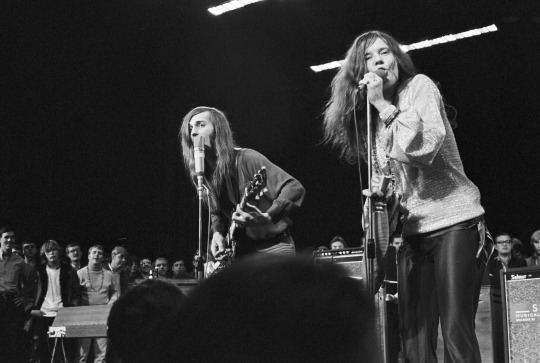
The Kozmic Blues Band performing live with American singer-songwriter Janis Joplin (1943 - 1970) in Frankfurt, Germany, 12th April 1969. Photo by John Byrne Cooke Estate
1 note
·
View note
Text
Music History Today: January 19, 2023
January 19, 1943: Janis Joplin was born in Port Arthur, Texas. She joined the band Big Brother and the Holding Company in 1966. Their 1968 album, Cheap Thrills, was a huge hit. However, friction between Joplin and the band prompted her to part ways with Big Brother soon after.
Joplin released her first solo effort, I Got Dem Ol' Kozmic Blues Again Mama!, in 1969. The album received mixed reviews, but her second project, Pearl (1971), released after Joplin's death, was hugely successful. The singer died of an accidental overdose on October 4, 1970, at age 27.
youtube
0 notes
Photo
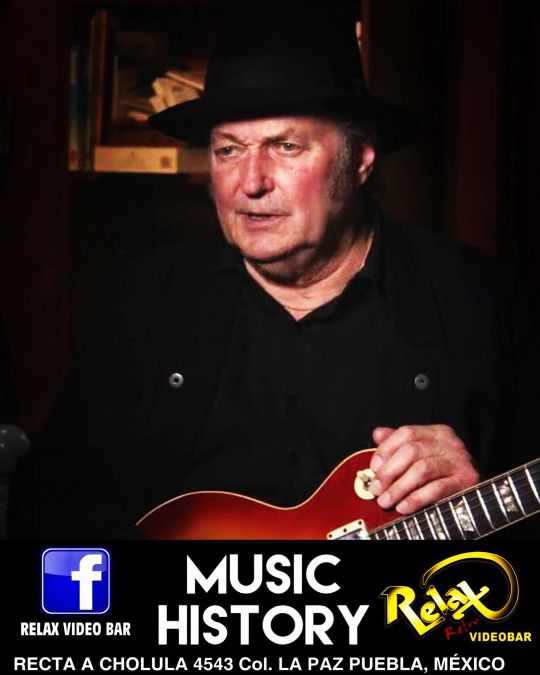
Sabías que, (1941-2015) El 18 de diciembvre de 1941 nació en Taft, California, el cantante y músico rock estadounidense Sam Andrew, guitarra solista y miembro fundador en 1965 de la banda californiana Big Brother and the Holding Company en la que Janis Joplin, la voz solista del grupo, comenzó a mostrar sus habilidades vocales. El álbum debut homónimo apareció en 1967 y contenía temas como ‘Bye bye baby’, ‘Down on me’ y ‘Call on me’, éste último compuesto por Sam. El segundo trabajo, ‘Cheap Thrills’ fue directo al nº1 con clásicos como ‘Piece of my heart’, ‘Ball and Chain’ y su versión del ‘Summertime’ de Gershwin, cuyo solo de guitarra está considerado por la revista Guitar Player uno de los diez mejores solos del rock psicodélico. En diciembre de 1968 Sam y Janis abandonan la formación para formar una nueva banda, la Kozmic Blues Band con la que graban ‘I Got Dem Ol' Kozmic Blues Again Mama!’. El resultado, aunque exitoso, no fue del todo satisfactorio para Sam que volvió con Big Brother con los que siguió trabajando hasta que en 1972 dejaron de actuar. Se trasladó a Nueva York donde estudió composición, armonía y contrapunto. Compuso una sinfonía y dos cuartetos de cuerda y varias bandas sonoras para films americanos y canadienses. En los años ochenta regresó a San Francisco y en 1987 los Big Brother se volvieron a reunir. Sam siguió al frente de la banda hasta su muerte en febrero de 2015 a los 73 años. @relaxvideobar www.relaxvideobar.com (at RELAX VIDEO BAR) https://www.instagram.com/p/CmX2TPwsHZ2sNWY8dPVfl7DCjhPlY4IP2SO8J80/?igshid=NGJjMDIxMWI=
0 notes
Text

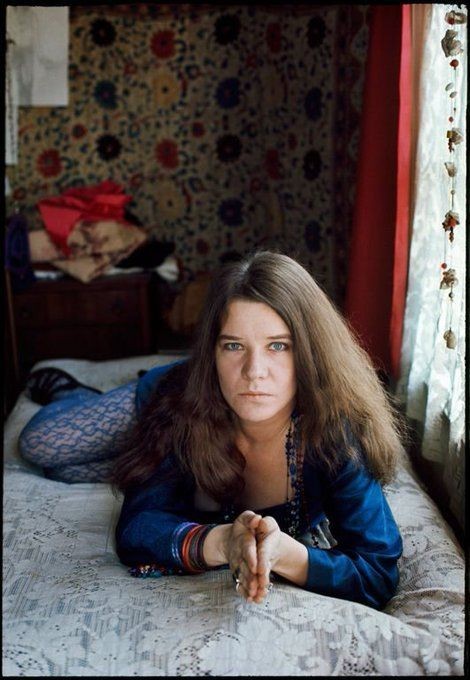
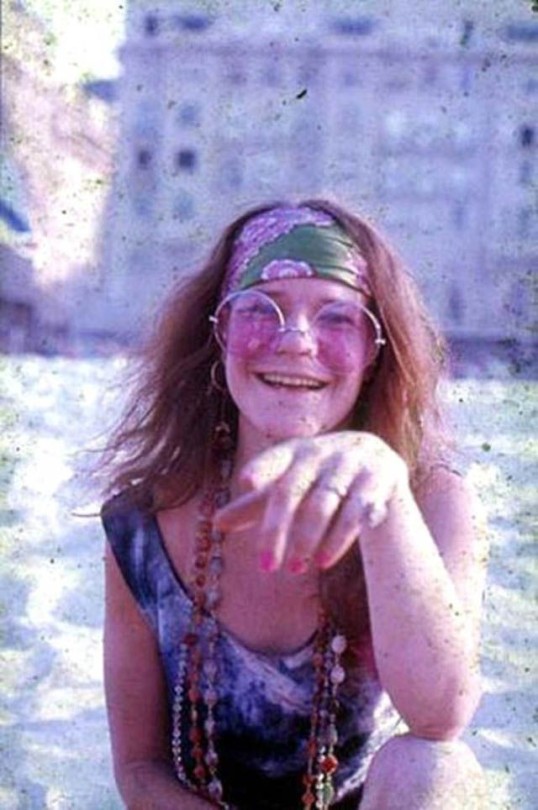


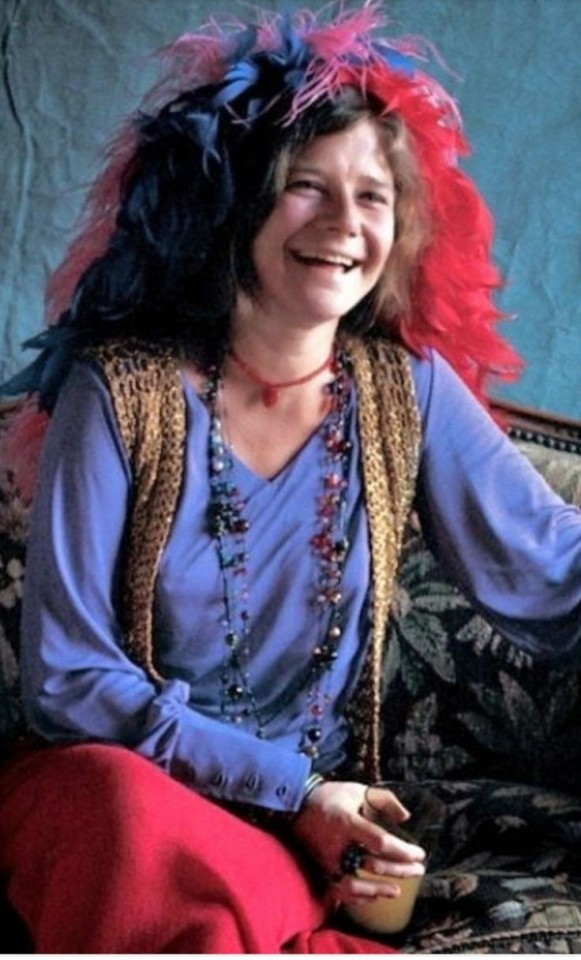


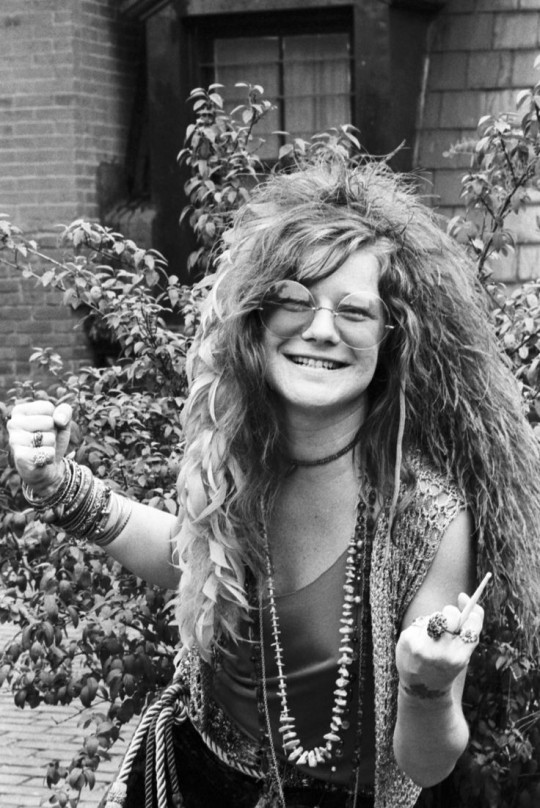
JANIS JOPLIN👩🎤
El 4 de octubre de 1970, en Los Ángeles, moría un símbolo de la contracultura y la primera estrella femenina del Rock & Roll, ese día se apagaba la vida de Janis Joplin.
Nacida en Porth Arthur, Texas, el 19 de enero de 1943, en el seno de una familia con desmesuradas convicciones religiosas, por lo que Janis solo podía conocer el mundo de manera furtiva.
No fueron los sueños ni deseos de aventura los que rompieron sus lazos familiares, fue la música, el blues y Jazz que escuchaban sus amigos y amigas eran inaceptables para su familia, para colmo no solo le gustaba escucharla, se descubrió facilidades para interpretarla, cambiando el coro de la iglesia por los oscuros escenarios del Rock & Roll.
Sus padres intentaron confinarla en un internado, pero ella insistió en cursar Bellas Artes en la Universidad de Texas, allí comenzó a beber en exceso y relacionarse con personas inadecuadas.
Para escapar de ese mundo, se mudó a San Francisco, logró dejar atrás a malvivientes y traficantes pero el alcohol viajó con ella, pese a relacionarse con músicos de las bandas The Grateful Dead y Jefferson Airplane, no aprovechó su oportunidad, se sumergió en el mundo de las drogas y se abandonó físicamente, llegó a pesar solo 35 Kg.
Luego de un breve matrimonio con Peter LeBlanc conoció al productor Chet Helms que la incluyó en el proyecto “Big Brother and The Holding Company” que en 1966 grabó su primer disco.
El éxito de esta agrupación elevó la autoestima de Janis que comenzó a cuidar su aspecto y aceptar presentarse en vivo acompañando a sus viejos amigos de The Grateful Dead y Jefferson Airplane.
En 1967 se presentó en el festival de Monterrey, el público esperaba ver a The Who, Mamas and The Papas, Otis Redding y Jimi Hendrix, pero cuando esta desconocida y tímida joven comenzó a cantar “Ball And Chain” el público estalló, fue su consagración.
La crítica coincidió que la banda no estaba a la altura de semejante talento, Chet Helms le armó otra banda "Kozmic Blues Band" con la que grabó su segundo disco.
Luego de una exitosa gira por Europa regresó a los EEUU para lo que sin saberlo sería la cima de su carrera, Woodstock 1969, de la que fue una de sus figuras principales.
Janis inició una desintoxicación de la heroína que fue un éxito, por ello generó confianza en otros productores, Albert Grossman le propuso una nueva banda integrada por músicos virtuosos, nacía “Full Tilt Boogie Band”.
El 4 de Octubre de 1970, cuando las grabaciones de un nuevo disco culminaron fue a una fiesta con su nueva pareja, Seth Morgan, allí sobraba la heroína, Janis alcoholizada sucumbió ante la droga que esta vez no la perdonó, cuando la ingresaron en el hospital, ya estaba muerta. El disco póstumo “Pearl!” fue un éxito de ventas y se mantuvo 14 semanas en el Nº1.
Wikipedia/Janis Joplin
#Porsimelees❤️
0 notes
Link
Check out this listing I just added to my Poshmark closet: Lucky Brand Janis Joplin & The Kozmic Blues Band Grey Burnout T-shirt Size M.
0 notes
Text
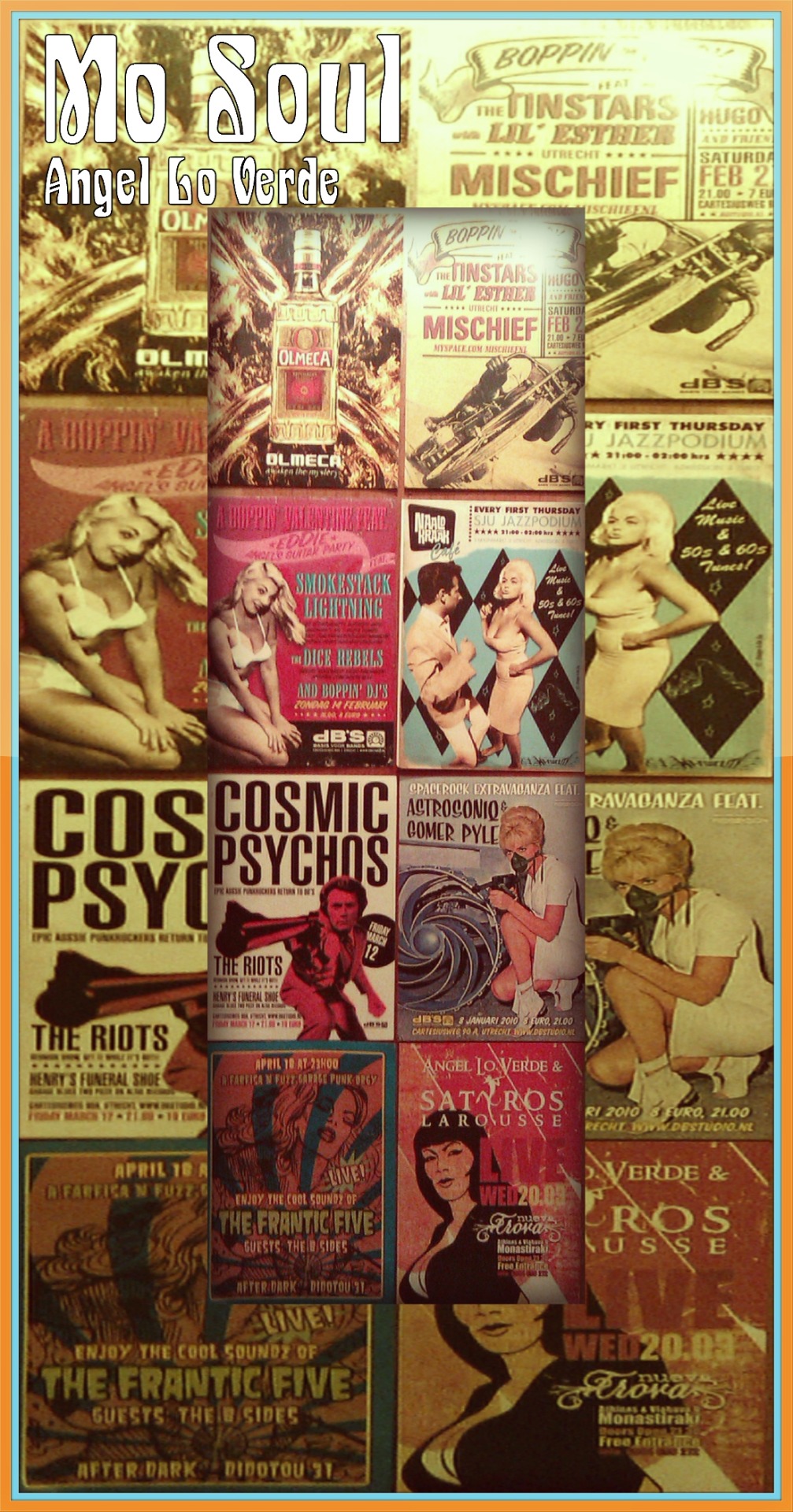
"Mo Soul" Player Playlist 6 March
Mark Farina - Cali Spacess (Julius Papp Mix)
The Brand New Heavies - Ride In The Sky
Incognito - Mindin' My Business
Hiroshi Fukumura & Sadao Watanabe - Hunt Up Wind
Kozmic Trooths - Dave Allen At Large (Blarney's Stoned)
Tim Wood - A Taste Of Honey
Space Invadas - Way We Feel
Da Lata - Changes
Jean-Claude Pelletier - Streaking Land
S-Tone Inc - Take 4
Reuben Bell - Superjock
Urban Species - Spiritual Love
Milcho Leviev - Blue Levis
Toshiyuki Honda - Thunderkiss
Patricia Marx - Burning Luv
If you really want to enjoy music and help musicians and bands, buy their lp’s or cd’s and don’t download mp3 formats. There is nothing like good quality sound!!!
(Angel Lo Verde / Mo Soul)
#mo soul#playlist#music#soul#blues#funk#jazz#lounge#reggae#rock#fusion#house#r&b#afro funk#disco funk#acid jazz#nu jazz
2 notes
·
View notes